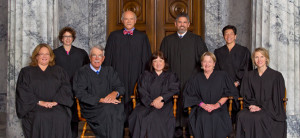
Guest column: Wash. employers must separately compensate piece-rate workers for breaks
By onBusiness Practices | Education | Legal
Editor’s note: A recent Washington state Supreme Court decision on how agricultural employers handle piece-rate staff might have ramifications for piece-rate collision repair employees in that state. Cory J. King, a partner in the San Diego, Calif., office of Fine, Boggs & Perkins LLP and probably one of the few attorneys in the country specializing in collision repair workplace law, has graciously offered this analysis of the ruling. The analysis is meant for informational purposes only; it is not intended as legal advice.
By Cory J. King
In the State of Washington, agricultural employees “shall be allowed a rest period of at least ten minutes, on the employer’s time, in each four-hour period of employment,” according to Washington Administrative Code 296-131-020(2) (emphasis added).
In an opinion issued July 16 in Demetrio and Paz v. Sakuma Brothers Farms, the Supreme Court of Washington held that, in order to give effect to the phrase “on the employer’s time,” employers must pay piece-rate agricultural employees “for rest breaks separate and apart from the piece rate” compensation. The court further required that “rest breaks for pieceworkers be paid at least at the applicable minimum wage or the employee’s regular rate, whichever is greater.”
Although the Demetrio opinion construed the regulation applicable to agricultural employees, the court noted that the language was patterned on another regulation that applies to non-agricultural employees, which provides, according to WAC 296-126-092(4), “Employees shall be allowed a rest period of not less than ten minutes, on the employer’s time, for each four hours of working time.”
With this background, it not a difficult jump to conclude that Washington employers in non-agricultural industries, such as automotive repair industries, who compensate their employees using piece-rate systems, will be held to the same standard set forth in the Demetrio case, i.e., they must pay for rest breaks separate and apart from the piece-rate compensation at the applicable minimum wage or the employee’s regular rate, whichever is greater.
What does this mean for Washington automotive repair shops? They should immediately assess their compensation plans to make sure that their piece-rate employees (i.e., flat-rate technicians) are separately paid for their rest breaks. Under the Supreme Court’s Demetrio opinion, this time must be paid at the greater of the applicable minimum wage, or the employee’s regular rate of pay for active production.
Despite this new requirement, the Demetrio includes some good news. Contrary to recent developments in California, the court acknowledges that an employer may comply with the State’s minimum wage requirements by averaging the total piece-rate compensation over all hours worked and, if the average rate is less than the applicable minimum wage, supplementing the piece-rate earnings to meet the minimum wage.
Thus, under the current statutory and regulatory scheme, it is unlikely that Washington will adopt the approach taken by the California Court of Appeals in Gonzales et al v. Downtown LA Motors et al, which rejected the averaging method and required that flat-rate technicians in California be paid at least minimum wage for each hour worked in addition to their flat-rate wages.
The Demetrio case should serve as a wake-up call to employers. Shops should immediately review their pay plans and if necessary consult with employment counsel experienced in representing the automotive industry to determine if their compensation programs are in compliance with all applicable laws.
If you would like additional information about these issues, please contact Cory J. King of Fine, Boggs & Perkins LLP at 760-891-1240 or cking@employerlawyers.com. Also, California repairers might want to check out King’s presentation “California Wage/Hour Compliance – The Wolf is at the Door, Are You Ready?” as part of the Society of Collision Repair Specialists’ Repairer Driven Education series at SEMA.
Images:
The Washington state Supreme Court in 2014. (Provided by Washington state Supreme Court)
Collision repair employment law specialist Cory King. (Provided by Cory King)

